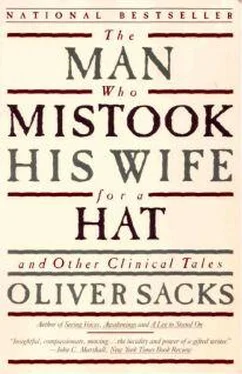Oliver Sacks - The man who mistook his wife for a hat
Здесь есть возможность читать онлайн «Oliver Sacks - The man who mistook his wife for a hat» весь текст электронной книги совершенно бесплатно (целиком полную версию без сокращений). В некоторых случаях можно слушать аудио, скачать через торрент в формате fb2 и присутствует краткое содержание. Жанр: Психология, на английском языке. Описание произведения, (предисловие) а так же отзывы посетителей доступны на портале библиотеки ЛибКат.
- Название:The man who mistook his wife for a hat
- Автор:
- Жанр:
- Год:неизвестен
- ISBN:нет данных
- Рейтинг книги:5 / 5. Голосов: 1
-
Избранное:Добавить в избранное
- Отзывы:
-
Ваша оценка:
- 100
- 1
- 2
- 3
- 4
- 5
The man who mistook his wife for a hat: краткое содержание, описание и аннотация
Предлагаем к чтению аннотацию, описание, краткое содержание или предисловие (зависит от того, что написал сам автор книги «The man who mistook his wife for a hat»). Если вы не нашли необходимую информацию о книге — напишите в комментариях, мы постараемся отыскать её.
The man who mistook his wife for a hat — читать онлайн бесплатно полную книгу (весь текст) целиком
Ниже представлен текст книги, разбитый по страницам. Система сохранения места последней прочитанной страницы, позволяет с удобством читать онлайн бесплатно книгу «The man who mistook his wife for a hat», без необходимости каждый раз заново искать на чём Вы остановились. Поставьте закладку, и сможете в любой момент перейти на страницу, на которой закончили чтение.
Интервал:
Закладка:
The man who mistook his wife for a hat
OLIVER SACKS

Who
MISTOOK
HIS WIFE
for
a HAT
and other clinical tales
To Leonard Shengold, M.D.
THE MAN WHO MISTOOK HIS WIFE FOR A HAT AND OTHER CLINICAL TALESCopyright © 1970,
1981, 1983, 1984, 1985 by Oliver Sacks. All rights reserved. Printed in the United States of America. No part of this book may be used or reproduced in any manner whatsoever without written permission except in the case of brief quotations embodied in critical articles and reviews. For information address HarperCollins Publishers, 10 East 53rd Street, New York, NY 10022.
Library of Congress Cataloging-in-Publication Data Sacks, Oliver W.
The man who mistook his wife for a hat and other clinical tales.
Bibliography: p.
1. Neurology-Anecdotes, facetiae, satire, etc. I. Title.
[RC351.S195 1987] 616.8 86-45686
ISBN 0-06-097079-0 (pbk.)
Contents
Preface page vii
Part One - LOSSESIntroduction page 3
1 The Man Who Mistook His Wife for a Hat page 8
2 The Lost Mariner page 23
3 The Disembodied Lady page 43
4 The Man Who Fell out of Bed page 55
5 Hands page 59
6 Phantoms page 66
7 On the Level page 71
8 Eyes Right! page 77
9 The President's Speech page 80
Part Two - EXCESSESIntroduction page 87
10 Witty Ticcy Ray page 92
11 Cupid's Disease page 102
12 A Matter of Identity page 108
13 Yes, Father-Sister page 116
14 The Possessed page 120
Part Three - TRANSPORTSIntroduction page 129
15 Reminiscence page 132
16 Incontinent Nostalgia page 150
17 A Passage to India page 153
18 The Dog Beneath the Skin page 156
19 Murder page 161
20 The Visions of Hildegard page 166
Part Four - THE WORLD OF THE SIMPLE
Introduction page 173
21 Rebecca page 178
22 A Walking Grove page 187
23 The Twins page 195
24 The Autist Artist page 214
Bibliography page 234
Preface
The last thing one settles in writing a book,' Pascal observes, 'is what one should put in first.' So, having written, collected and arranged these strange tales, having selected a title and two epigraphs, I must now examine what I have done-and why.
The doubleness of the epigraphs, and the contrast between them-indeed, the contrast which Ivy McKenzie draws between the physician and the naturalist-corresponds to a certain doubleness in me: that I feel myself a naturalist and a physician both; and that I am equally interested in diseases and people; perhaps, too, that I am equally, if inadequately, a theorist and dramatist, am equally drawn to the scientific and the romantic, and continually see both in the human condition, not least in that quintessential human condition of sickness-animals get diseases, but only man falls radically into sickness.
My work, my life, is all with the sick-but the sick and their sickness drives me to thoughts which, perhaps, I might otherwise not have. So much so that I am compelled to ask, with Nietzsche: 'As for sickness: are we not almost tempted to ask whether we could get along without it?'-and to see the questions it raises as fundamental in nature. Constantly my patients drive me to question, and constantly my questions drive me to patients-thus in the stories or studies which follow there is a continual movement from one to the other.
Studies, yes; why stories, or cases? Hippocrates introduced the historical conception of disease, the idea that diseases have a course, from their first intimations to their climax or crisis, and thence to their happy or fatal resolution. Hippocrates thus introduced the case history, a description, or depiction, of the natural history of disease-precisely expressed by the old word 'pathology.' Such
histories are a form of natural history-but they tell us nothing about the individual and his history; they convey nothing of the person, and the experience of the person, as he faces, and struggles to survive, his disease. There is no 'subject' in a narrow case history; modern case histories allude to the subject in a cursory phrase ('a trisomic albino female of 21'), which could as well apply to a rat as a human being. To restore the human subject at the centre-the suffering, afflicted, fighting, human subject-we must deepen a case history to a narrative or tale; only then do we have a 'who' as well as a 'what', a real person, a patient, in relation to disease-in relation to the physical.
The patient's essential being is very relevant in the higher reaches of neurology, and in psychology; for here the patient's personhood is essentially involved, and the study of disease and of identity cannot be disjoined. Such disorders, and their depiction and study, indeed entail a new discipline, which we may call the 'neurology of identity', for it deals with the neural foundations of the self, the age-old problem of mind and brain. It is possible that there must, of necessity, be a gulf, a gulf of category, between the psychical and the physical; but studies and stories pertaining simultaneously and inseparably to both-and it is these which especially fascinate me, and which (on the whole) I present here-may nonetheless serve to bring them nearer, to bring us to the very intersection of mechanism and life, to the relation of physiological processes to biography.
The tradition of richly human clinical tales reached a high point in the nineteenth century, and then declined, with the advent of an impersonal neurological science. Luria wrote: 'The power to describe, which was so common to the great nineteenth-century neurologists and psychiatrists, is almost gone now. … It must be revived.' His own late works, such as The Mind of a Mnemonist and The Man with a Shattered World, are attempts to revive this lost tradition. Thus the case-histories in this book hark back to an ancient tradition: to the nineteenth-century tradition of which Luria speaks; to the tradition of the first medical historian, Hippocrates; and to that universal and prehistorical tradition by which patients have always told their stories to doctors.
Classical fables have archetypal figures-heroes, victims, martyrs, warriors. Neurological patients are all of these-and in the strange tales told here they are also something more. How, in these mythical or metaphorical terms, shall we categorise the 'lost Mariner', or the other strange figures in this book? We may say they are travellers to unimaginable lands-lands of which otherwise we should have no idea or conception. This is why their lives and journeys seem to me to have a quality of the fabulous, why I have used Osier's Arabian Nights image as an epigraph, and why I feel compelled to speak of tales and fables as well as cases. The scientific and the romantic in such realms cry out to come together-Luria liked to speak here of 'romantic science'. They come together at the intersection of fact and fable, the intersection which characterises (as it did in my book Awakenings) the lives of the patients here narrated.
But what facts! What fables! To what shall we compare them? We may not have any existing models, metaphors or myths. Has the time perhaps come for new symbols, new myths?
Читать дальшеИнтервал:
Закладка:
Похожие книги на «The man who mistook his wife for a hat»
Представляем Вашему вниманию похожие книги на «The man who mistook his wife for a hat» списком для выбора. Мы отобрали схожую по названию и смыслу литературу в надежде предоставить читателям больше вариантов отыскать новые, интересные, ещё непрочитанные произведения.
Обсуждение, отзывы о книге «The man who mistook his wife for a hat» и просто собственные мнения читателей. Оставьте ваши комментарии, напишите, что Вы думаете о произведении, его смысле или главных героях. Укажите что конкретно понравилось, а что нет, и почему Вы так считаете.












